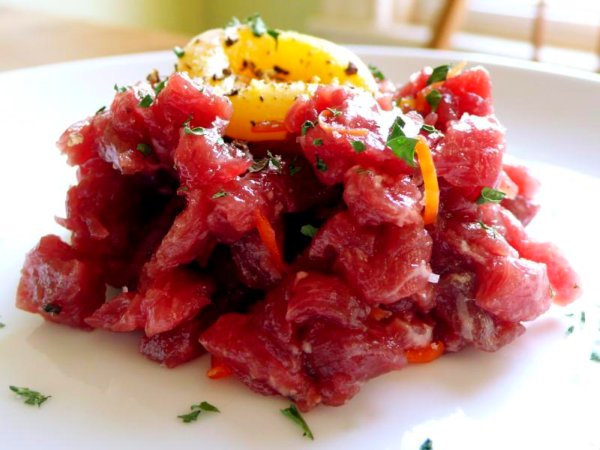A chef in Windsor (that’s in Canada, across the river from Detroit, where they have a decent hockey team) is going to serve raw meat dishes lamb tartare and lamb Carpaccio this Canada Day weekend to protest local health types banning the raw beef dish kibbeh from a handful of Lebanese restaurants and steak tartare from another.
“Until an inspector tells me to stop, I’ll keep serving it. And if they tell me to stop, I will probably still do it,” said Rino Bortolin.
 Lawyers, open your bank accounts.
Lawyers, open your bank accounts.
Bortolin called the Windsor Essex County Health Unit unit “culturally insensitive” to "hard-working small businesses."
“Certain preparations have been accepted for years and pose no harm when done properly. Those have been on menus for decades,” Bortolin said. “These meats and dishes have been prepared and eaten this way for centuries.”
Bortolin said the health unit has overreacted to an incident in Ottawa.
In February, the Canadian Food Inspection Agency issued a media release warning customers to not consume finely ground beef sold at New Middleast Supermarket in Ottawa.
“The affected ground beef is a finely ground raw beef known to be used for Kebbeh,” the release said.
The release never mentioned a restaurant. In an email sent Wednesday, CBC News asked the CFIA why it made reference to a specific dish. The agency has not responded.
The owner of the New Middleast Supermarket told CBC News that he didn’t sell the beef to restaurants and that the meat in question was consumed by a customer.
“If it’s the source material, investigate that source and fix that problem,” Bortolin said.
Chief medical officer Dr. Allen Heimann said beef must be cooked to an internal temperature of 71 C for 15 seconds before public consumption.
Bortolin contends the law does not prohibit him from serving raw meat, only that he must "be aware of susceptible segments of society," such as children and the sick.
Bortolin said he hasn’t yet heard the reason behind the health unit’s sudden enforcement. He said he’s not aware of anyone in Windsor getting sick after eating kibbeh at a restaurant.
He said before ordering, customers should ask when a restaurant’s meat arrived and where it came from.
“I welcome people asking questions,” he said. “All my meat comes fresh from Essex County. We do that for a reason.”
I wouldn’t eat there.

.jpg) food poisoning after consuming raw beef liver from 1998 through the end of 2011. About 9% of those cases were caused by E. coli contamination.
food poisoning after consuming raw beef liver from 1998 through the end of 2011. About 9% of those cases were caused by E. coli contamination.  The owner-operator of China BBQ, 57-year-old John Zee Ng, repeatedly stored barbecued meat and other foods at improper temperatures and spent more time in concealing the illegal practice from inspectors. This was Ng’s fourth related conviction. He along with his wife and son and his Company were fined a record $51,520 in 2008.
The owner-operator of China BBQ, 57-year-old John Zee Ng, repeatedly stored barbecued meat and other foods at improper temperatures and spent more time in concealing the illegal practice from inspectors. This was Ng’s fourth related conviction. He along with his wife and son and his Company were fined a record $51,520 in 2008.